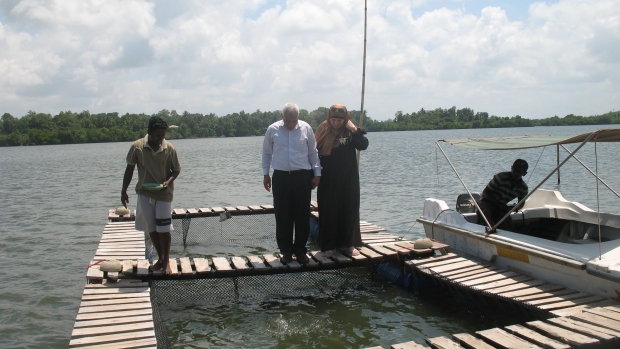Grants :: Small Grant Facilities :: Piloting red tilapia cage culture as an alternative livelihood in the Maduganga estuary
Piloting red tilapia cage culture as an alternative livelihood in the Maduganga estuary

Tourists feed tilapia , Sri Lanka © KEkaratne , 2009
Objectives
This project had four objectives:
- to raise the living standard of the coastal community in Maduganga;
- to improve the community’s awareness of the environment;
- to promote sustainable use of marine and coastal resources; and
- to introduce red tilapia cage culture as a livelihood alternative.
Background
Hybrid tilapia (Oreochromis spp.) are the second most important farmed fish species in the world. They are widely distributed and successfully farmed in tropical, subtropical and temperate regions. Their fast growth, tolerance of low oxygen levels, resistance to disease, mass breeding potential and good market acceptance makes them an ideal food fish. Raising these fish in confined, controlled conditions is an aquaculture practice that is fast becoming widespread around the world.
Red tilapia, as it is known in Sri Lanka, is a popular food fish which can be grown in saltwater ponds or sea cages with low production costs and minimal environmental impacts. Introducing red tilapia cage culture to coastal communities around the Maduganga estuary has the potential to raise living standards and create an eco-friendly alternative livelihood for poor fisher families.
Target beneficiaries
Four traditional fishermen from the community-based Ampe Mithuru Freshwater Fisheries Cooperative Society in Maduganga.
Outputs
- Construction of eight fish-rearing cages for red tilapia.
- Transferral of technology for intensive culture of finfish to fishermen.
- Training for fishermen in cage construction, feed preparation using local ingredients, and feed management.
- Generation of an alternative source of income for these fishermen, leading to enhanced economic growth and indirect employment.
- Reduced exploitation of local mangroves and wildlife.
Accomplishments and challenges
Project beneficiaries successfully established a cage rearing system for red tilapia, specifically genetically improved farmed tilapia (GIFT). The experience of the project indicates that cage rearing offers a viable alternative occupation to sea fishing. Project beneficiaries also gained skills and knowledge on efficient fish management systems. Their success has created a noticeable extension effect, with neighbouring fishermen now constructing fish cages and rearing fish themselves.
The additional income from the sale of red tilapia has helped to reduce exploitation pressure on nearby mangroves and other coastal resources. Fish farming is also contributing to alleviating poverty sustainably, since it has low operational and environmental costs.
Challenges:
One challenge faced by the project was the difficulty in finding a buyer for the entire harvested stock of tilapia.
Contributions to cross-cutting themes
All project beneficiaries were males.
Lessons Learned
It is essential to identify an appropriate market and develop a strong marketing strategy before embarking on an activity of this nature. Social mobilisation is also necessary for stable and sustainable implementation of project activities.
The target beneficiaries have been happy with the success of their venture and have agreed to keep it running. They have produced a second harvest of ted tilapia, and the Sewalanka Foundation has committed itself to supervising and monitoring their efforts, and to supporting them in book keeping, fish farming technology and other relevant matters.
Project Facts
Country
Location
Maduganga, Sri Lanka
Topic
Duration
1st Jul 2009 to 31st Dec 2009
MFF Grant Amount
US$4,321
Implementing Partner
Sewalanka Foundation
Bakmeegahawattha,
Kahawannagama Road,
Thalpe, Sri Lanka
Tel: +94 91 2282674
“The programme aimed to promote an attractive livelihood activity which is acceptable ecologically, socially and economically, and will protect natural resources in and around Maduganga estuary. It is good to see young fishermen continue fish farming even though the donor funding and other support have ended.”
— MRS MAHEENI SINGAPPULI
NATIONAL FISHERIES COORDINATOR, SEWALANKA FOUNDATION
